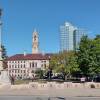It stood for 53 years connected to both North Station and the old Boston Garden: A 19-story, buff-brick, Art Deco building, originally called the Hotel Manger, and later the Madison Hotel.
But on May 15, 1983, there were no guests. Just 500 pounds of dynamite, while news helicopters buzzed overhead and 26,000 spectators looked on. In the late 1920s, it took years to build the hotel. It took only seconds to bring it down.
https://www.youtube.com/watch?v=Ml8Vkr0ARu0
The Madison wasn’t the biggest hotel in Boston, nor was it the most glamorous, but it had its moments. Proximity to the Garden made it popular with boxers and visiting hockey and basketball teams, as well as entertainers, including faux cowpokes Roy Rodgers and Gene Autry.
Its darkest day came in 1950, when distinguished Harvard professor F.O. Mathieson checked in for the night. He would never check out.
Brown University’s Ted Widmer, has studied Matthiessen and taught literature courses at Harvard that Matthiessen established.
“He spread a kind of gospel of American literary confidence that made Americans feel good,” Widmer said of Matthiessen.
Matthiessen's seminal work, American Renaissance, completely revolutionized our understanding of American culture at a time when few took it seriously.
“Emerson, Hawthorne Thoreau, Melville, Whitman. He not only helped us understand each one, but then how they were connected to each other,” he said.
Matthiessen was political, left-leaning, and gay. His progressive worldview had served him well for years, but in the late 1940s things began to sour. His lifetime partner passed away and Matthiessen himself came under attack.
“There was a rising conservatism that was targeting intellectuals including him, He was being named in lists of suspicious academics.
Widmer says that Matthiessen was no communist and few people knew American history better.
“He called himself a Christian and a Socialist. He left a note at the hotel saying that. And he felt that the world wasn’t very hospitable to either kind of person,” he said.
That note was the last thing Matthiessen would ever write. In the wee hours of the morning, he threw himself out a 12th story window and fell to his death.
“I think he was lonely, he was embarrassed to be named in articles listing suspicious intellectuals. And I think at that moment with conservative politics and pretty harsh personal politics all on the rise, it was just hard for a sensitive, perhaps too sensitive intellect like Matthiessen's,” Widmer said.
But there were brighter days ahead at the Madison. Perhaps it’s biggest came in September 1964, when it was invaded. The Beatles first American tour brought them to the Boston Garden – and brought Beatlemania to the Madison.
Lynn native Rich Herhsenson was 18 when he bluffed his way into the Beatles press conference at the Madison before the show, using his student ID as a press pass. To his shock, it worked. Hershenson called it one of the greatest moments of his life.
“The whole street blocked, blocks were mobbed with kids. You couldn’t walk you couldn’t drive,” he said. ”These guys are the most popular desired people in the whole world and now I’m in their presence up close. It was magical, it was flabbergasting, it was astonishing, it was sheer delight and joy.”
Emboldened by the success of his scheme, Hershenson asked the Fab Four three separate questions. When it was all over, he even grabbed a souvenir.
“I got their ashtray, their ashes, their cigarette stubbs and their chewed gum. And I took them with me and I took them home! That’s how crazy we all were and how magical it was to just get something that had come from them, live and in person.”
The Madison Hotel, where Professor Matthiessen took his final breaths, where the Beatles camped out for a night, and countless other moments - magical and mundane -unfolded in anonymity. And it all came crashing to the ground, 31 years ago this week.





